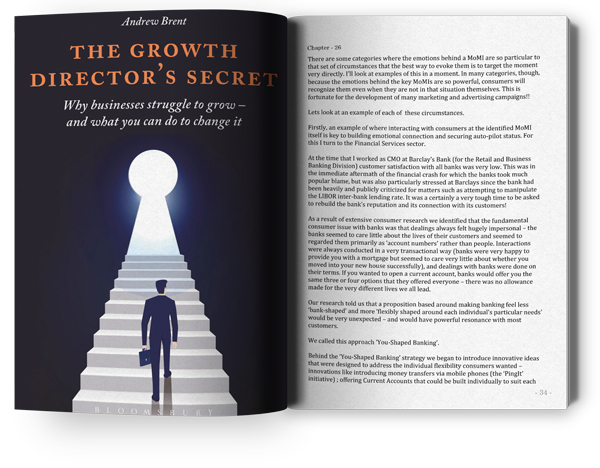One of the most famous (or, perhaps, notorious) quotes in the history of marketing is the assertion by Lord Leverhulme (founder of Unilever) that he knew that half of the money he spent on advertising was wasted – but that he didn’t know which half.
Perhaps, if Lord Leverhulme had had access to the most recent understanding of how our brains work, he might have been a little less puzzled.
Daniel Kahneman’s 2002 Nobel Prize-winning research showed that most decisions – including nearly all brand choice decisions – are made by our subconscious brains (he called this the brain’s ‘System 1’). Kahneman also showed how decisions are driven predominantly by emotional factors – not the rational, evaluatory processes that the business world often assumes its customers use.
My book, ‘The Growth Director’s Secret’ extends Kahneman’s analysis further and shows that our subconscious brains choose brands that best meet the needs of a small number of ‘Moments of Maximum Emotional Engagement’ (I call these ‘MEE Moments’) where the performance of the product or service in question is disproportionately emotionally important.

Further, the evidence shows that once these ‘autopilot’ brands have been chosen we return to them time after time – and, even more significantly, subconsciously ‘screen out’ messages from competitors. Its our brains’ way of protecting us from the complexity of the world around us.
In effect this means that a large proportion of marketing messages reach minds that are subconsciously closed to them – maybe Lord Leverhulme’s assessment of his advertising wastage was an under-estimate!
To ensure you are always ‘Marketing to Open Minds’ there are 3 Golden Rules:
- First – identify those Moments of Maximum Emotional Engagement in your category and build propositions to win there. Brands like Lynx (moment where young man encounters attractive females) or Premier Inns (moment of waking refreshed and energised after a great night’s sleep) have done this with spectacular success.
- Second - connect emotionally with your consumers to secure their ‘permission to sell’. Our subconscious brains are hard-wired to respond much more positively to messages from sources we like, or believe are sympathetic to us. Before you attempt a rational ‘sell’ you must persuade consumers that you empathise with them.
- To illustrate - think of the persuasive power of Dove’s ‘Campaign For Real Beauty’ which succeeded because it connected emotionally with its target female consumer. Or, in an entirely different sphere, the way that politicians who connect emotionally (Bill Clinton, Tony Blair, Donald Trump) are consistently more successful than super-rational but ‘dry’ politicians like Hillary Clinton, Gordon Brown – perhaps Theresa May.
- Third – ensure you offer a ‘Killer Performance Edge’ – a genuine reason for why you will outperform others at the crucial MEE Moments – Premier Inn’s Hypnos mattresses, 4 choices of pillow softness and ‘Good Night Guarantee’ is a great example of this.
Follow the 3 Golden Rules and you will increase your chances of ensuring your marketing messages always reach minds that are open to receive them.
Fail to follow them and you may just offer further confirmation of the accuracy of Lord Leverhulme’s grim statistics!
By Andy Brent, author and founding partner, Think Again Growth
